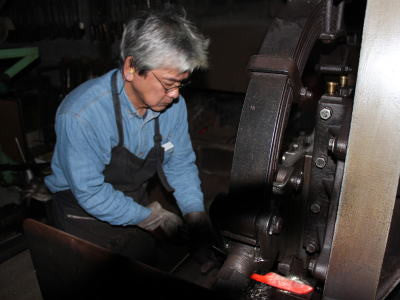We Offer DHL EXPRESS Flat Rate Shipping Worldwide. Just $10 USD for US, Canada, Australia, Asian countries. US$15 for Europe and other Countries in the world
For our U.S. Customers — No extra fees! All orders ship via FedEx DDP (duties & tariffs are covered by JCK). Enjoy fast, worry-free delivery! Learn More
We Offer DHL EXPRESS Flat Rate Shipping Worldwide. Just $10 USD for US, Canada, Australia, Asian countries. US$15 for Europe and other Countries in the world
Echigo blacksmith, Tsukasa Hinoura is the third-generation of his family to become a blacksmith. In addition to inheriting his family's trade name "Ajigataya", he decided that he would also produce his own original line of knives under the brand name "Tsukasa". He told us that he is committed to finding his own unique way to best express his skill and passion for knife making.
"Honed Beauty” was our first impression of Master Hinoura’s knives. They were perfect knives with beautiful seamless lines and form, no sharp corners, no distortion, no gaps etc. It was clear that, from start to finish, Master Hinoura devotes tremendous time making each knife and that he pays great attention to every single detail. We learned that, unlike the majority of Japanese forge-smiths, Master Hinoura never uses modern machinery and he even forge welds modern hi-tech steels using the old traditional Wa-Kaji hand forging technique because he believes that it produces the most beautiful seamless welds between the layers of Hagane (Carbon steel) and Jitetsu (Wrought iron) that are used in the construction of his stunning Kitae-Ji (鍛地) (“Damascus”) knives. Similarly, Master Hinoura still uses the traditional Japanese Hizukuri hot hammer forging technique (A labor-intensive process, that uses repeated use of light hammer blows to shape the blade and improve the micro-structure of the steel, leading to improved toughness and sharpness) and the traditional method of water tempering because he believes that they produce the best results. Master Hinoura also hand hones each knife with several different grits of whetstone before polishing the final cutting edge with a natural Japanese water-stone. This time-consuming process takes at least two hours per blade to complete, but he believes it is necessary because it produces the sharpest edge possible on his carbon steel blades and it also brings out the character of the iron used in his Damascus cladding. We agree. The polished layers of steel and iron in the bevel of his knives have a beautiful and mysterious sparkling surface… a “Honed Beauty”. In addition, the way in which the steel interacts with the whetstones allows Master Hinoura to confirm that the blade steel has been properly heat-treated.

From forge-welding and Hizukuri to water hardening and hand honing, it requires a tremendous amount of time, effort and skill to make one of Master Hinoura’s knives. However, it is this uncompromising approach that is the secret behind his truly outstanding knives; Even among the numerous forged knives that are produced in Japan, we believe they are without equal. We believe, that when you have the chance to examine his knives for yourselves, you will also appreciate the functional and aesthetic beauty created by the perfect fusion of carbon steel and soft iron. Each knife created by Master Hinoura is a lasting expression of his creative and passionate soul.
Unryu-Mon” (雲流紋) (“Flowing Clouds Pattern”)
Master Hinoura’s “Unryu-Mon” series of knives have a unique twist pattern Kitae-Ji (鍛地)(“Damascus”) cladding and a Hitachi Shirogami #2 (White Steel No.2) blade core. The beautiful cladding is created using a time-consuming process that begins by forge welding together numerous alternate layers of carbon steel and wrought iron to produce a laminated bar. This bar is then heated, twisted and forged to produce a bar that has a pattern which resembles flowing clouds. The bar is then forged to form a ‘u-shaped’ jacket, that is subsequently wrapped around the piece of high carbon steel which will eventually become the blade core and cutting edge. Consequently, once these two pieces have been forge welded together and formed in to a knife, the stunning Damascus pattern will flow seamlessly from one side of the blade, over the spine, and down the other side. Master Hinoura’s distinctive “Unryu-Mon” series of Damascus knives will provide you with both aesthetic enjoyment and craftsmanship of the highest order.
Each knife is supplied with a special Kiri (Paulownia) wood presentation box that has attractive calligraphy and bears Master Hinoura’s personal stamp in vermillion red ink. The ‘D-shaped’ knife handles are made from Chestnut Wood and Water Buffalo Horn and have a charred finish that both compliments the Damascus blade and provides an excellent grip.
Please note that because these knives are hand forged, the Damascus pattern of each knife is unique. Consequently, if there is a particular knife that interests you, please do not delay your order for too long!
